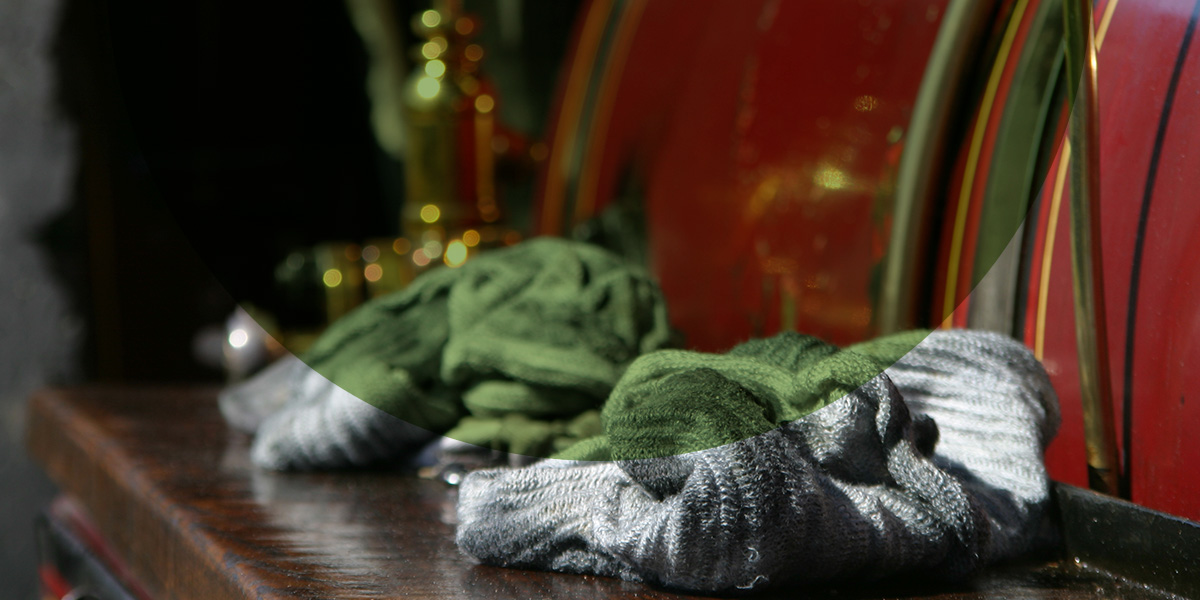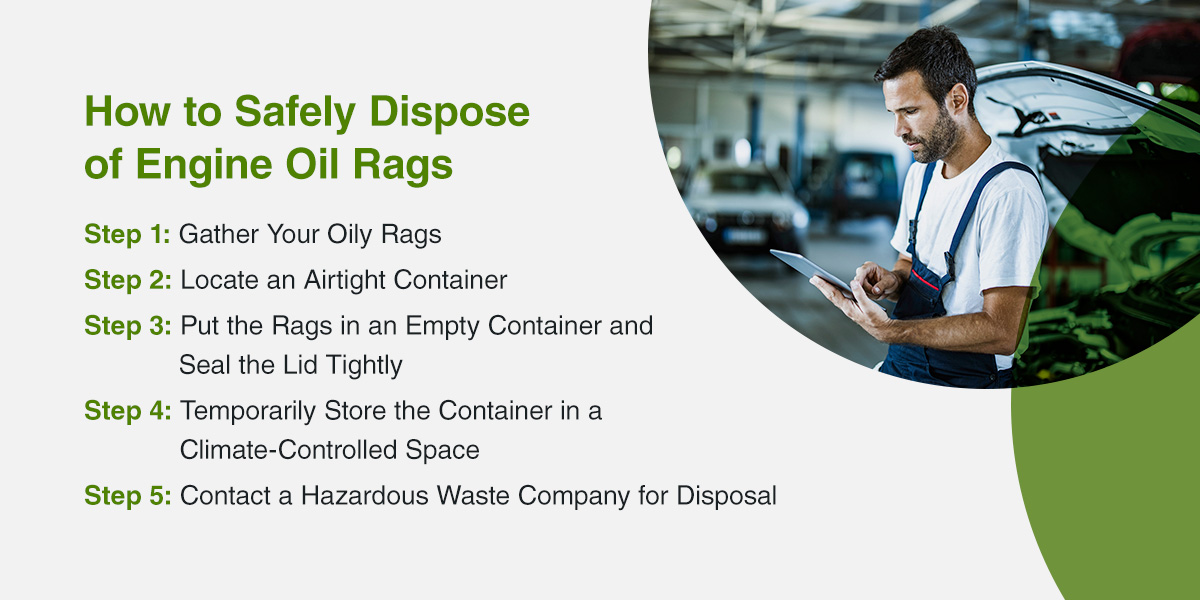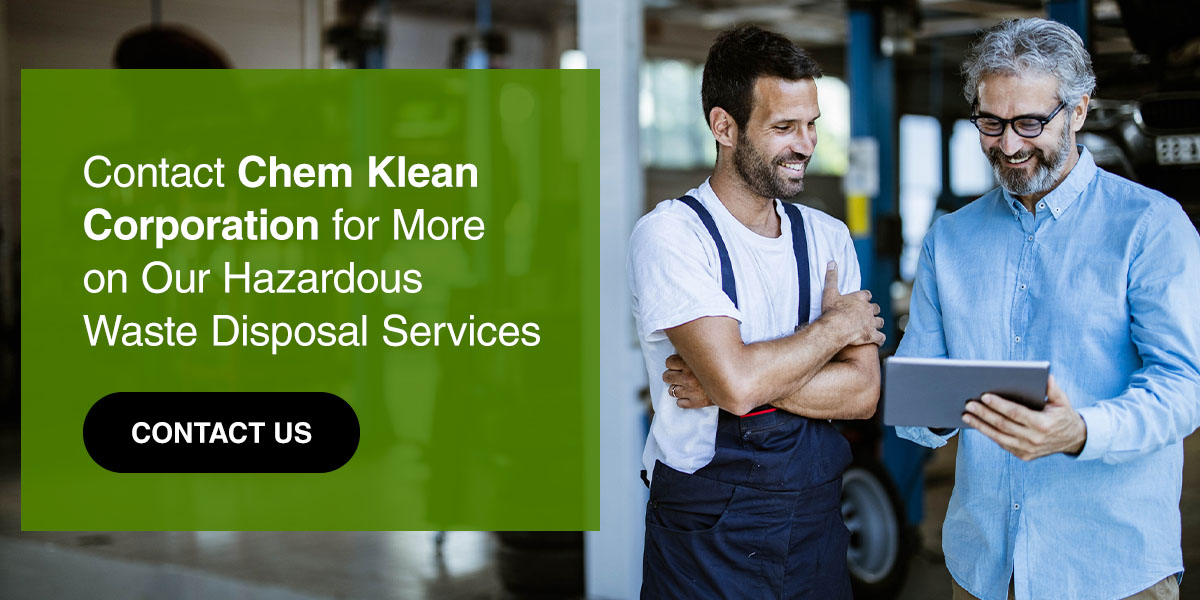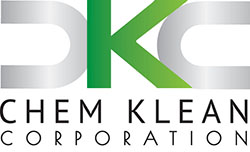
Oily rags have the potential to spontaneously combust, which means they can quickly become a job site hazard if left unattended at your automotive business. Mitigating that risk takes knowledge of the proper disposal practices and having an established protocol in place for workers to follow.
Here, we are breaking down the best way to dispose of oily rags and why it is important to handle this task correctly to keep your team as safe as possible.
The Dangers of Oily Rags
Whether your mechanic team is wiping off their tools or cleaning up after an oil leak, oil-covered rags are part of daily operations for many businesses in the automotive industry. However, the rags used in your operation can be extremely dangerous if handled incorrectly.
Oily rags can oxidize and produce heat while they are drying. If someone on your team were to leave these rags piled up or folded, the heat could become trapped and create a fire. The rag's material acts as fuel when the heat and oxygen combine to become combustible.
Spontaneous combustion poses a serious threat to your workers, customers and property, especially if there are other flammable materials nearby.
In addition to being a fire hazard, oily rags contain dangerous chemicals. The majority of vehicle fluids, including engine oil, power steering fluid and transmission fluid, are toxic. Used engine oil is particularly harmful and dangerous. If it combusts, it can release unhealthy byproducts into the air, including:
- Lead
- Zinc
- Arsenic
Oily Rag Disposal Regulations
Auto businesses must abide by certain regulations relating to oily rags and hazardous waste to remain compliant and minimize the risk of harm to people, animals and property.
The United States Environmental Protection Agency (EPA) has special requirements for managing oil cleanup materials. The agency states that businesses must regard rags with free-flowing oil as hazardous waste and treat them as such.
The Occupational Safety and Health Administration (OSHA) Standard 1926.252(e) mandates that you keep all oily rags, along with solvent waste and other flammable liquids, in a covered, fire-resistant container until removed from the site.
Your state and local municipality may also impose their own disposal regulations for throwing out combustible materials and waste.

How to Safely Dispose of Engine Oil Rags
Understanding the best way to throw out your rags is essential for combating potential hazards and keeping your shop, dealership or facility secure. Before getting started, see if there is a local hazardous waste company that serves your area. These companies make the disposal of oily rags easy.
Practice the following steps for safely disposing of your shop's engine oil rags to help keep risk to a minimum:
Step 1: Gather Your Oily Rags
The first thing you'll do is gather your soiled rags. Be sure not to leave them wrinkled or folded for any period of time, especially in sunlight or near another heat source.
Step 2: Locate an Airtight Container
You will also need to grab an empty container. Select one that is made of a fire-resistant material and features an airtight lid. It should comply with both the United States Department of Transportation (DOT) and United Nations (UN) standards. Ensure the container is clean and that there is no flammable residue present inside.
Size is another important consideration. Choose an option that is big enough to fit all of your rags, or grab multiple containers.
Step 3: Put the Rags in an Empty Container and Seal the Lid Tightly
Place your oily rags into the container. Do not leave them unattended. Place the lid on the container promptly. Sealing it securely is essential to avoid a potential hazard. You do not want any more oxygen entering the environment and giving the rags a chance to combust.
Step 4: Temporarily Store the Container in a Climate-Controlled Space
Once you've secured the lid on your container, take it to a safe location. You should keep these containers only temporarily while waiting for hazardous waste collection.
Be sure to clearly label any containers holding oily rags. Keep them stored in a dry, climate-controlled space where they won't be tampered with. Monitor your containers periodically to ensure they are secure.
Step 5: Contact a Hazardous Waste Company for Disposal
The final step is to contact a local hazardous material removal company that offers oil rag disposal services. They'll have the expertise to safely transport and dispose of these materials for your business so they do not harm the environment.
Frequently Asked Questions About Tossing Oily Rags
Explore some of the most common questions about disposing of oily rags:
Can I Burn Oily Rags?
No, you should never attempt to burn your business's oily rags. In fact, because of the byproducts they release, you can get in legal trouble for burning them in most municipalities.
Can I Put Oily Rags in the Washing Machine?
It is unsafe to wash oily rags in your washing machine. In addition to potentially damaging your machine's motor, the fumes from the engine oil can catch fire. As your washer heats up during the wash cycle, the fire risk becomes even greater.
You also do not want any of the toxins from the oil in your washing machine or water systems.
How Long Does It Take for Oily Rags to Combust?
The time it takes for an oily rag to combust ultimately depends on a few factors, such as the surrounding temperatures and how you situate soiled rags. Certain ambient conditions can speed up the oxidation process, resulting in a fire more quickly. Oily rags that you store improperly could combust in as little as one hour. In some cases, combustion could occur a day or two after handling the rags incorrectly.
Can I Put Oily Rags in the Dryer?
No. Even if you have washed them and broken down the oils, you should never put oily rags in a drying machine.
Can Oily Rags Go in General Waste?
No. Businesses should always take used rags to a designated facility or work with a hazardous waste disposal service to throw away oily rags. Putting them in general waste can be dangerous and illegal.

Contact Chem Klean Corporation for More on Our Hazardous Waste Disposal Services
When you need comprehensive waste management services for your automotive business, turn to Chem Klean Corporation. We are located in South Florida and serve customers in Miami-Dade, Broward, Palm Beach and Monroe counties.
We can help your business stay compliant with industry regulations by properly disposing of flammable rags, transmission fluid, paint-related materials and more. Chem Klean Corporation is family-owned and -operated, and we have more than 20 years of experience in the hazardous waste industry.
Are you ready to get started? Contact our local team to learn more today!











